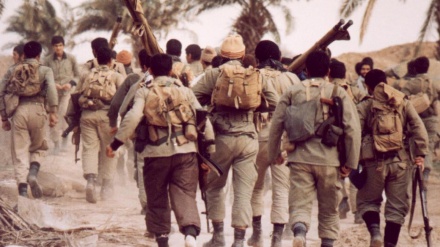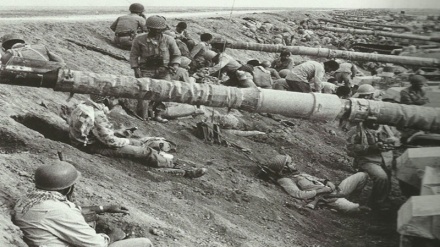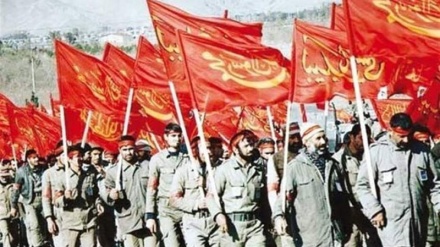Glimpses of Epic of 8-Year Holy Defense (54)
In the previous episode, you heard that Val-Fajr 4 operation was launched to deal a crushing blow to the war machine of Saddam's regime. But the dictator in Baghdad would always try to retaliate his defeats on the battlefield by bombardment and missile attacks against Iranian cities and villages.
In one of the most tragic crimes, Saddam's army targeted a school in Behbahan city which led to martyrdom of 95 students and injury of more than 400 others. On October, 30, 1983, a session was held attended by the heads of three branches of government and presided by Imam Khomeini. The topic of talks was on the way of reaction to Saddam's atrocities. The Imam stressed that the Islamic Republic would never attack Iraqi residential areas as it is illegitimate. Imam Khomeini said during a public speech after the session, "You must be heedful lest you may get angry and retaliate because of bombardment of your cities and killing your dear ones and retaliate. This way is not taking revenge of him. You must take revenge of Saddam and the Ba'athist party, which you are already doing. Take heed lest you may shoot even a single bullet toward their cities. Those are the cities that are innocent just like our Behbahan. Basra is innocent, too. Mandali is innocent, too. All of these are innocent. They are under oppression. We should preserve humane aspects till the end. We should preserve humane aspects till martyrdom and death; and never get angry, [saying] 'because he is doing this we, too, had batter target one of their cities.' No, it is never so."
Imam Khomeini's reaction to the unmanly and dastardly measures of Saddam was originated in the lofty teachings of Islam. Unlike the western culture in which the end justifies the means, Islam stresses that the means should preserve the sanctity and holiness of the end. The means should be at the service of humane and divine objectives. The great Leader of the Islamic Revolution further explained, "The codes are Islamic codes. Here is the Islamic Republic. Islam rules here. Therefore, you should take care of yourselves. Those who have power; the government has power, the IRGC has power, the army has power, Basij has power, these that have power should observe humane aspects and Islamic aspects more than others. This power should be in its place and not exceed its place. I hope that, through observing these humane and Islamic aspects, you will be the role model for all countries which have received or will receive our issues."
Just compare this conduct of Imam Khomeini with the duplicitous behavior of western governments who claim to defend human rights. This very conduct day by day increased the Imam's popularity among masses in the world. This true disciple of the school of the Prophet and his infallible successors proved his commitment to humane values even in war. As a matter of fact, one of the features distinguishing the 8-year Holy Defence from other contemporary wars and many wars in the world was the rule of humane and religious values on battlefields. Anyone who went to the Iranian battlefield would be absorbed by the spirit of chivalry and manliness of hundreds of thousands of voluntary youths.
War is violent and deadly by nature. But the Iranian youths had turned the battlefronts into the place of competition for ethical values and virtues. That's why they would give their water to the Ba'athist captives while they were thirsty themselves.
In addition to targeting cities and killing innocent people, Saddam's regime tried to attack ships, tankers, oil sites and Iranian ports to prevent oil export and import of goods. Since the outbreak of the war, Iraq attacked the Iranian vessels especially those which headed toward Imam Khomeini port. These attacks were launched from a missile base in Ra's al-Bisheh and through helicopters or aircraft equipped with French Exocet missiles. As Iran's largest port for goods import was located at the end of Khor Musa, the trade ships had no other choice but dock at Imam Khomeini port. Therefore, the Islamic Republic would escort trade ships with the help of the navy and air force. But, Iraq used to target these ships by caterpillar missiles and it was very difficult to escort the ships since the missiles were launched from the shore.
France was one of the main supporters of Saddam's army during the 8-year war. It supported Iraq militarily, politically, logistically and in terms of weapons and equipment. In February 1983, France began training a number Iraqi pilots to deliver Super Étendard fighters to Iraq. In November 1983, France delivered these fighters and the relevant ammunitions and equipment such as Exocet missiles. In the summer of 1983, too, the French government under Francois Mitterrand delivered 60 Mirage F1-2000 aircraft and a big number of Super Puma helicopters, laser bombs, Exocet anti-ship missiles and many RADAR systems. These weapons were sold within the framework of a 1.6-billion-dollar contract. Delivery of fighters and guided missiles enhanced Iraq's power in the air so that Saddam's regime escalated its assaults in the Persian Gulf against Iranian ships and oil installations.
Imam Khomeini, in his message on the occasion of the third anniversary of the Holy Defence, said, "Now that Saddam has been slapped by the Islamic Republic and there is no hope left for him, he has clung to French government to strike Iran's economic sources with destructive weapons and add another page to his crimes. I warn all countries in the region and countries which use oil that the Iranian government stands with full strength against this crime and it is determined, if such a crime occurs, to close the Hormuz Strait with full strength and not let even a drop of oil be exported from it. The French government is responsible for consequences of this great incident."
FK/RM/ME


